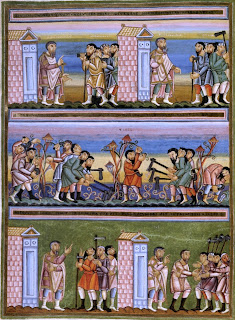1st Trinity I
Matthew 20:1-16
"The kingdom of the heavens is like a man, the master of his house, who went out early in the morning to hire workers for his vineyard. Agreeing to pay them one denarius a day, he sent them out into his vineyard.
"At about nine o'clock,
he went out
and saw others standing in the marketplace, and he said to them, 'Go
also into my vineyard, and I will give you whatever is right.' So they went.
Burnand
"He went out again at about noon and at three o'clock and did the same. At
five o'clock, he went out and found others standing there, and he said to them,
'Why do you stand here all day idle?' They said, 'Because no one has hired us.'
He said, 'You, too, go into the vineyard.'
Burnand
"And when evening came, the master of the vineyard said to his steward, 'Call the workers and give them their wages, beginning with the last ones hired and going on to the first.'
 |
| Burnand |
"Those who had been hired at five o'clock came forward, and each received one denarius. Therefore, when it was the turn of those hired first, they expected to receive more. However, they, too, also received one denarius each. They took it, but they began to grumble against the master of the house. 'These men who were hired last only worked one hour, and you have made them equal to us, who have borne the burden of the work and the heat of the day.'
"However, he
answered one of them,
saying, 'Friend, I am not being unjust to you. Did you
not agree with me for one denarius? Take what you have earned and go. I wish to
give to the one hired last the same as I give to you. Have I not the right to
do as I wish with what is mine? Or do you give me an evil look because I am
generous?'
"Thus will the last be first and the first will one day be last."
First Trinity I
February 7, 2021
Matthew 20:1-16
In the business world, what one is paid is often kept secret. This practice allows the owner to hire people as cheaply as possible, by the hour even.
The gospel presents an interesting work
situation involving full
disclosure. The master contracts openly with each worker for the standard
day-laborer wage, for just enough to support their life for a day, no matter
how long or short they had worked. Those working more hours did not earn more.
Nor did those who worked fewer make less. Each simply received enough for the
day’s need, for working together as long as they could. The day’s wages are
given based on daily needs and human dignity, not on the number of hours
worked.
Byzantine, Workers in the Vineyard
Christ offers this story as a likeness of the 
Codex aureus Epternacensis, 11th cent.
kingdom of the
heavens, which is a kingdom arising in human hearts. He shows us that expecting
more than, more than what others get, more recognition, more praise,
more rewards than others, is not what we human beings on earth have actually
contracted for; for the true being of the economic sphere flourishes in an
atmosphere of brotherhood.
We have all agreed to work on fields of earth. Our work on earth gives us the opportunity to earn both the integrity of our selfhood (symbolized by our one denarius) and at the same time to build a healthy relationship to our fellow workers.
In order to develop both, we must avoid comparisons. Some come early to working on the fields of the kingdom, some late. Comparing ourselves with others and expecting more for ourselves is deadly here. It poisons both our integrity and our cooperation. For we have no way of knowing another human being’s true standing in God’s kingdom. And we have no right to denigrate their contribution to the work.
All we can be sure of is that the Master’s task is
urgent—the harvest needs to be brought in. The work needs to be done, and we
need all the workers we can get. It’s not about what is more advantageous to me
or even about what appears to be fair. We are all working for the Father. The
Father will give us what we need for our daily bread: the strength we need to
maintain our integrity and work well with others.













